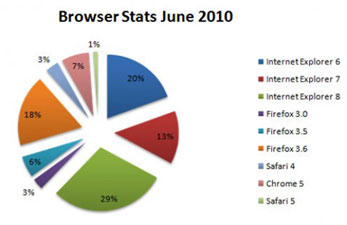Web Browser History

The history of the web browser dates back in to the late 1980s, when a variety of technologies laid the foundation for the first web browser, WorldWideWeb, by Tim Berners-Lee in 1991. That browser brought together a variety of existing and new software and hardware technologies.
Douglas Engelbart developed the concept of hypertext long before Berners-Lee and CERN. It became the core of the URL, which itself is the core of the World Wide Web. Berners-Lee does acknowledge Engelbart's contribution, but only barely. In March, 1986, Engelbart gave permission and aid to the University of Melbourne to port his hypertext to the DEC/Unix platform. From Melbourne, this effort spread throughout the world, reaching both CERN and the University of Illinois. This became the source for both Berners-Lee's browser in 1991 and Mosaic in 1993. The source of this information comes from the computer scientist, Nevile J. Angove, who was commissioned to travel from Australia to the USA in 1986 in order to obtain Engelbart's permission and aid in porting hypertext to Unix.
The introduction of the NCSA Mosaic web browser in 1993 - one of the first graphical web browsers - led to an explosion in web use. Marc Andreessen, the leader of the Mosaic team at NCSA, soon started his own company, named Netscape, and released the Mosaic-influenced Netscape Navigator in 1994, which quickly became the world's most popular browser, accounting for 90% of all web use at its peak.
Microsoft responded with its browser Internet Explorer in 1995 (also heavily influenced by Mosaic), initiating the industry's first browser war. By bundling Internet Explorer with Windows, Microsoft was able to leverage its dominance in the operating system market to take over the web browser market; Internet Explorer usage share peaked at over 95% by 2002. Internet Explorer has 65% browser usage share as of October 2009 according to Net Applications.
Opera first appeared in 1996; although it has never achieved widespread use, having 2% browser usage share as of October 2009, it has a substantial share of the fast-growing mobile phone web browser market, being pre installed on over 40 million phones. It is also available on several other embedded systems, including Nintendo's Wii video game console.
In 1998, Netscape launched what was to become the Mozilla Foundation in an attempt to produce a competitive browser using the open source software model. That browser would eventually evolve into Firefox, which developed a respectable following while still in the beta stage of development; shortly after the release of Firefox 1.0 in late 2004, Firefox (all versions) accounted for 7.4% of browser use. As of October 2009, Firefox has a 24% usage share.
Apple's Safari had its first beta release in January 2003; as of October 2009, it has a dominant share of Apple-based web browsing, accounting for just over 4% of the entire browser market. Its rendering engine, called WebKit, is also running in the standard browsers of several mobile phone platforms, including the iPhone OS, Google Android, Nokia S60 and Palm WebOS.
The most recent major entrant to the browser market is Google's WebKit-based Chrome, first released in September 2008. As of October 2009, it has a 4% usage share.
Which is the Best Web Browser?

On many occasions, we are asked a very simple question - which is the best web browser to use? However, this question cannot be easily answered by pointing to a specific browser program. In order to best answer that question, we need to compare the popular web browsers available for different platforms (IE. Windows, Linux, Macs). The question should be re-phrase: Which is the best web browser for my operating system?
Our company and its employees are Windows users, given this fact we will only be comparing web browsers used with Windows Operating Systems. Since the days of with Netscape, we have used most of the popular Windows based web browsers including Internet Explorer, Mozilla Firefox, and Chrome. Internet Explorer was definitely the most use browser over the long run. Recently over the past year we have noticed IE 8 has become slow and crashes a lot more than previous versions. It also renders websites differently than Mozilla or Google Chrome. One last thing that we find annoying and worthless is all the toolbars Internet Explorer can become inundated with. We have seen IE windows with five to ten toolbars installed, it is almost impossible to surf the web with that many options and annoyances.

Mozilla Firefox is a good web browser, especially because of the number of add-ons available. Mozilla allows you to install and even create almost any type of add on you can imagine. The drawback is the slow start-up speed and the number of toolbars that can also be acquired.
Over the last year, our company has switched to Google Chrome as our main browser. We still use IE and Mozilla to check cross compatibility when designing web sites/web applications. We also recommend Chrome to our clients, simply because it is fast and easy. If you compare opening two differnt browsers (IE vs. Chrome or Chrome vs. Mozilla) Chrome will always win. Chrome does not allow toolbar installation. This also added security by not allowing programs to automatically install toolbars.
Google Chrome is great because there are no distracting icons, no logo, not even a status bar. Just the three important buttons near the top left - Back, Forward and Refresh. The menu tools and settings options can be viewed on clicking the wrench icon. Web developers will find this browser specially helpful when coding and testing web pages. The Inspect Element feature gives a full "biodata" of the web page element. What more does a developer need? Not only have we found Chrome faster, its also a safer browser (when I compare to Internet Explorer). We recommend this browser to anyone! Get Google Chrome Now!


